
China Britain Medical and Dental Academy
Continuing Professional Development Courses


Introducing Prescribing Safety Assessment to Chinese Medical and Dental Professionals
Thank you for your interest in the Prescribing Safety Assessment (PSA).
The British Pharmacological Society and MSC Assessment are working together to deliver the Prescribing Safety Assessment (PSA) that allows all students to demonstrate their competencies in relation to the safe and effective use of medicines.
Candidates
If you are a medical or foundation school candidate expecting to take part in the forthcoming events (PSA 2018) instructions on how to register for the PSA online system would have been provided by your school. You must activate your account and then login before you can access the PSA system. You are advised to do this as soon as possible in order to gain access to practice papers and information pages on the PSA.
Click here for an overview of account activation for the Prescribing Safety Assessment by PSA Medical Director, Professor Simon Maxwell. Once you have successfully completed your account activation you will be able to view further materials to make you more familiar with the PSA assessment environment.
For general information about the assessment and its structure, click on the sections at the top of this page.
Justification
Prescribing is a fundamental part of the work of Foundation Year 1 doctors, who write and review many prescriptions each day. It is a complex task requiring knowledge of medicines and the diseases they are used to treat, the careful judgement of risks and benefits of treatment, and attention to detail.
As well as offering the potential for improving health, it is an activity associated with potential hazards: a GMC-sponsored study found that 9% of hospital prescriptions contain errors (‘An in-depth investigation into causes of prescribing errors by foundation trainees in relation to their medical education – EQUIP study’). It is also apparent in other research that this is the area of the Foundation Doctor role that new graduates find the most challenging (The state of medical education and practice in the UK report: 2014 and Be prepared: are new doctors safe to practise?). As a result, in Outcomes for graduates (originally published in Tomorrow’s Doctors), the GMC defined prescribing competencies required of new medical school graduates.
The Prescribing Safety Assessment allows candidates to demonstrate their competencies in relation to the safe and effective use of medicines.
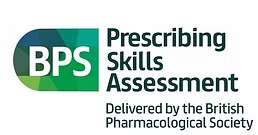

Prescribing Safety Assessment (PSA)
Overview
The Prescribing Safety Assessment (PSA) is a pass/fail assessment of the skills, judgement and supporting knowledge related to prescribing medicines in the NHS. The PSA assesses the prescribing skills of final-year medical students and is based on the competencies identified by the General Medical Council outlined in Outcomes for graduates (originally published in Tomorrow’s Doctors). These competencies include writing new prescriptions, reviewing existing prescriptions, calculating drug doses, identifying and avoiding both adverse drug reactions and medication errors and amending prescribing to suit individual patient circumstances. The content of each item is relevant to the prescribing tasks expected of an F1 doctor, i.e. the questions refer to ailments and drugs that graduates are likely to be dealing with in year one of the Foundation Programme.
Structure
Question types
- Prescribing
- Prescription Review
- Planning Management
- Communicating Information
- Calculation Skills
- Adverse Drug Reactions
- Drug Monitoring
- Data Interpretation
Domains
- Medicine
- Surgery
- Dental Practice
- Paediatrics
- Psychiatry
- Obstetrics & Gynaecology
- General Practice
- Elderly Care
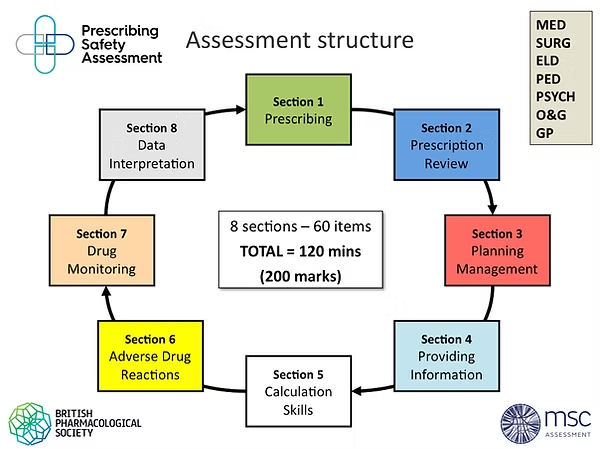
These are delivered within eight sections over 120 minutes, as illustrated by the assessment map taken from the PSA Blueprint. All candidates have access to the British National Formularythroughout the assessment. Assessment map:
For a better idea of what assessment items look like please see the Example Question Items in the Resources section. Students who register with their medical school to take part in PSA 2018 will also gain access to interactive PSA Practice Papers
Who's Involved
The Prescribing Safety Assessment (PSA) is led by the British Pharmacological Society and the MSC Assessment PSA Executive Board through two workstreams. The PSA Assessment Board is involved in item and test development. The PSA Stakeholder Group enables effective engagement of representatives from key groups including medical students and the General Medical Council.
The project has received funding from the Department of Health, Health Education England and NHS Education for Scotland to support the development and piloting of the assessment and it is currently funded by contributions from MSC Assessment and the BPS.
PSA Executive Board

Professor Jenny Higham
Co-chair of the PSA Executive Board
Chair of the Medical Schools Council

Professor David Webb
Co-chair of the PSA Executive Board
President of the British Pharmacological Society

Professor Simon Maxwell
PSA Medical Director
Chair of the Stakeholder Group & Chair of the Technical Development and Delivery Group

Dr Lynne Bollington
Lead Consultant, PSA Assessment Build Observer, PSA Executive Board

Professor Tony Weetman
Chair, MSC Assessment

Jonathan Brüün
Chief Executive, British Pharmacological Society

Professor Ian Hall
Trustee, MSC Assessment

Dr Katie Petty-Saphon
Chief Executive, MSC Assessment

Dr Kurt Wilson
Acting Chair of the PSA Assessment Board

Dr Mark Gurnell
Chair, Medical Schools Council Assessment Alliance

Professor Robin Plevin
Treasurer, British Pharmacological Society

Professor Val Wass
GMC Assessment Adviser
PSA Assessment Board
Dr Kurt Wilson
Acting Chair of the PSA Assessment Board
Eleanor L Dakkak
Assessment Board Member
Dr Andrew Hitchings
Assessment Board Member
Dr Rick Plumb
Assessment Board Member
Dr Mark Glover
Assessment Board Member
Dr Caroline Clark
Assessment Board Member
Dr Richard Perrett
Assessment Board Member
Dr Katie Maddock
Assessment Board Member
Dr Faye Bradshaw
Assessment Board Member
Resources
Please note that these questions are to demonstrate the format of the PSA item types only and do not reflect the actual standard of the PSA.
More practice items are available to candidates who are registered by their medical school and activate their accounts.
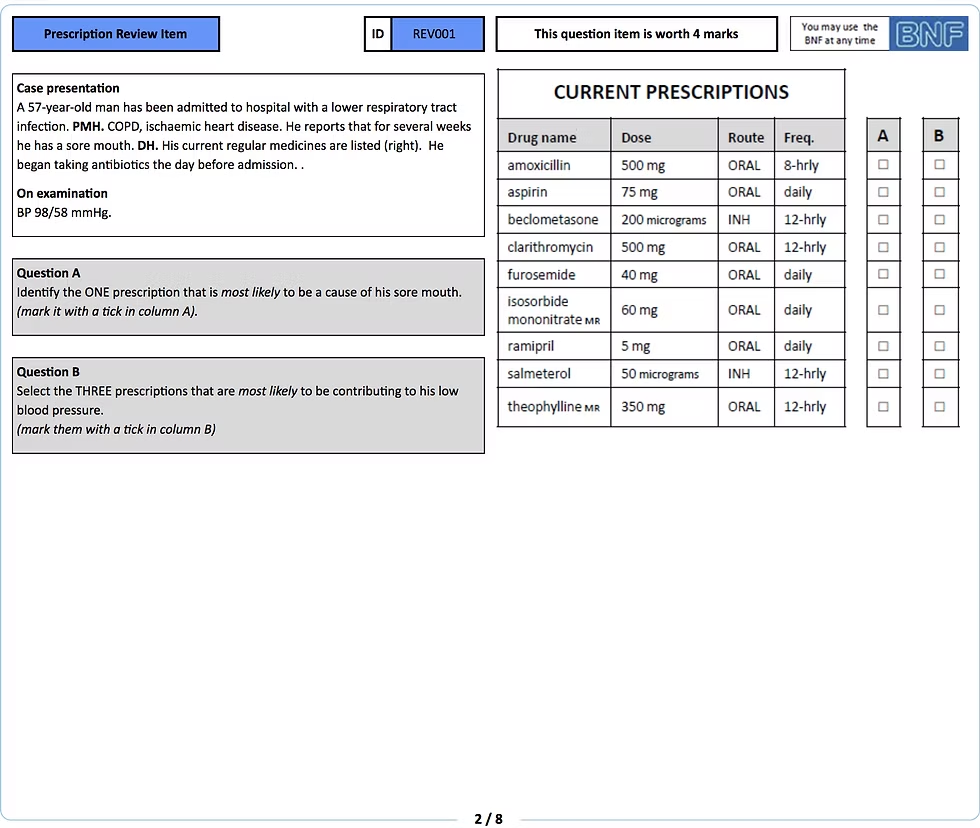
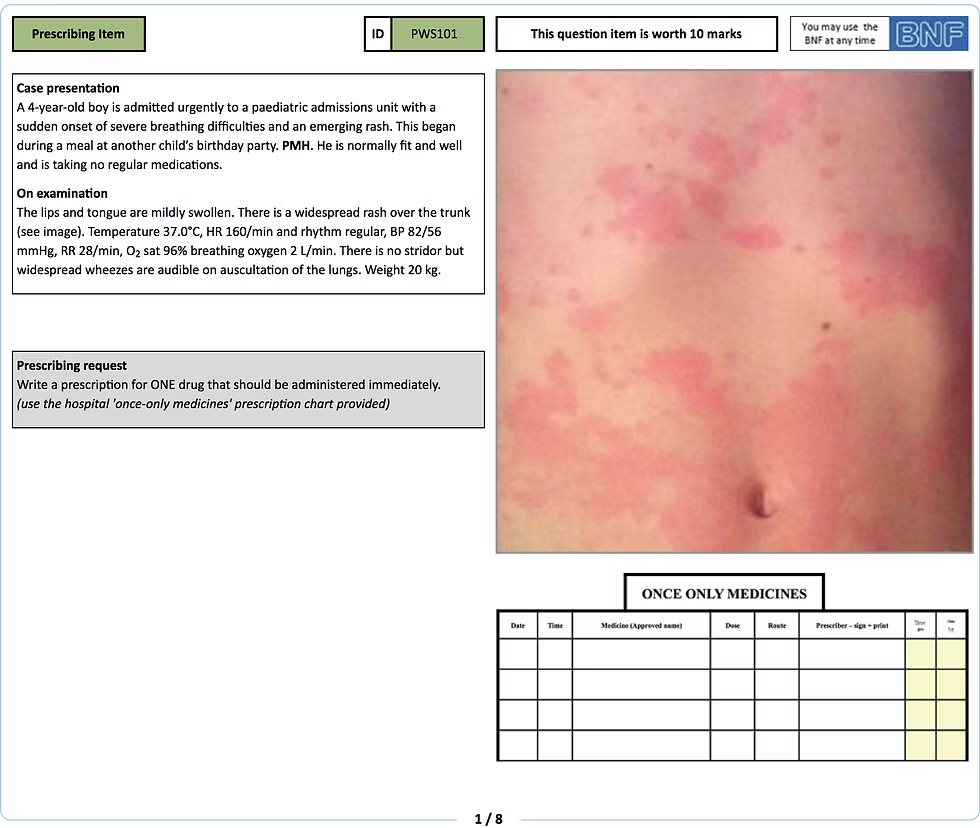
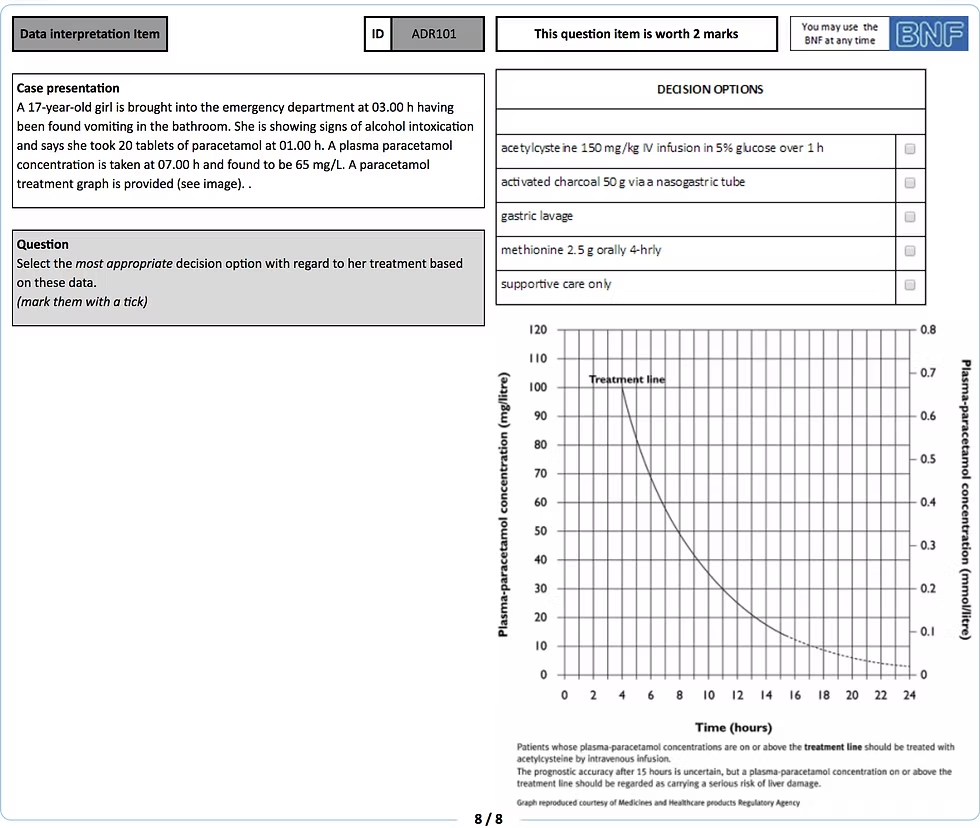
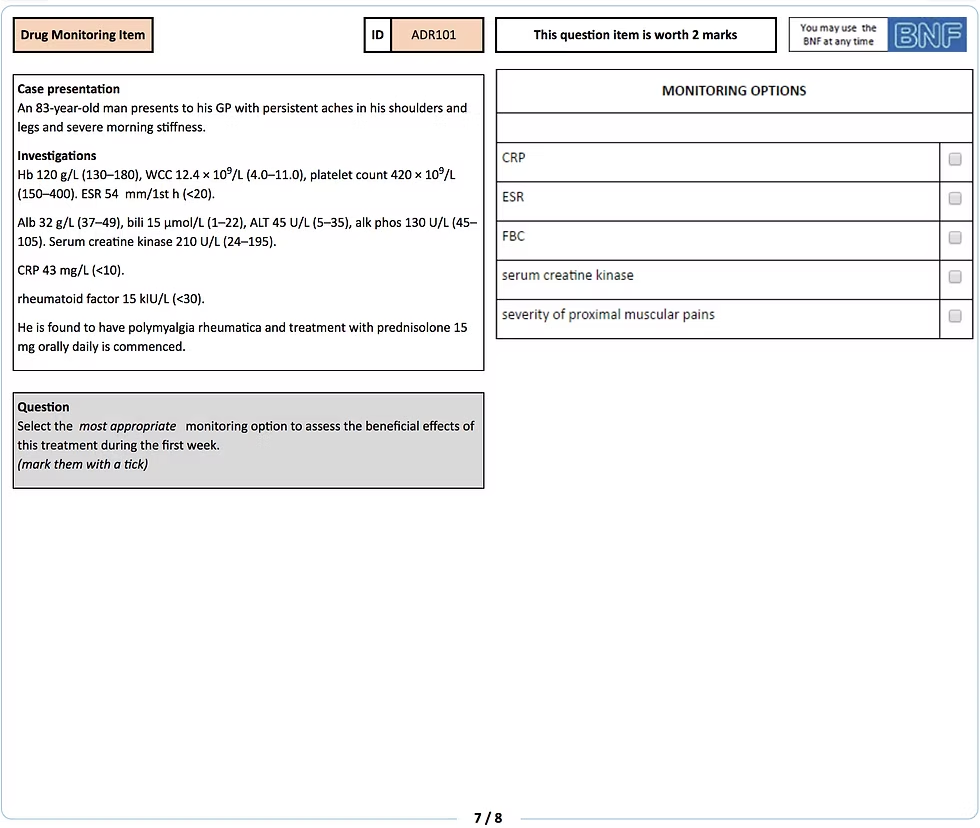
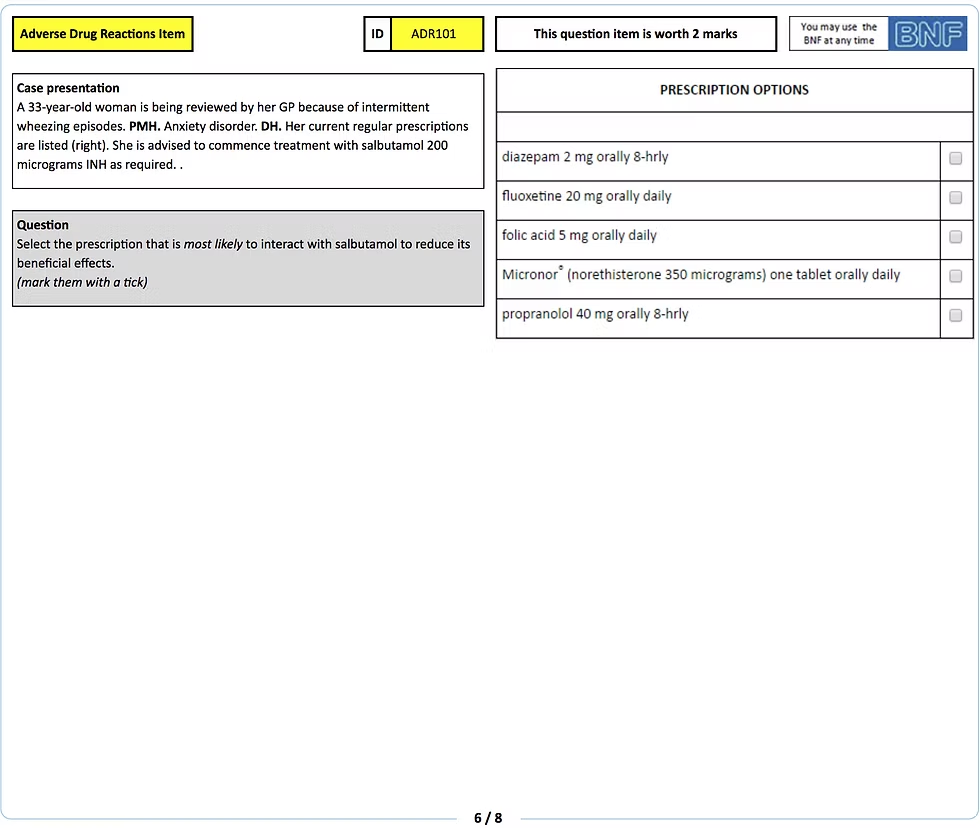
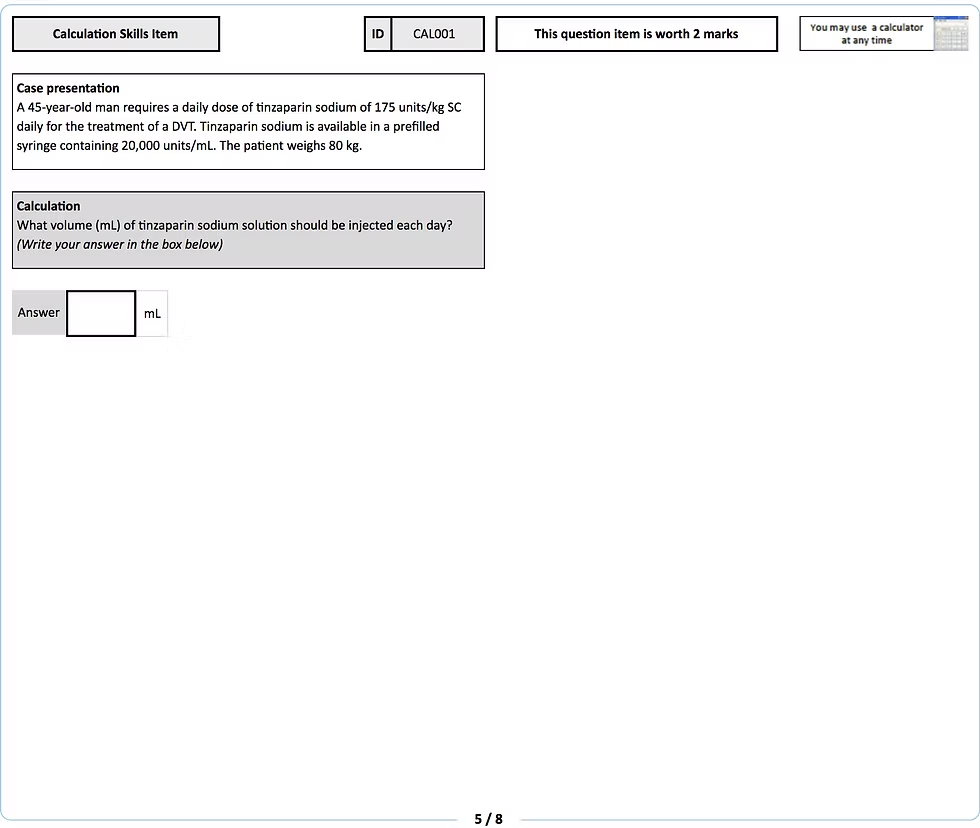
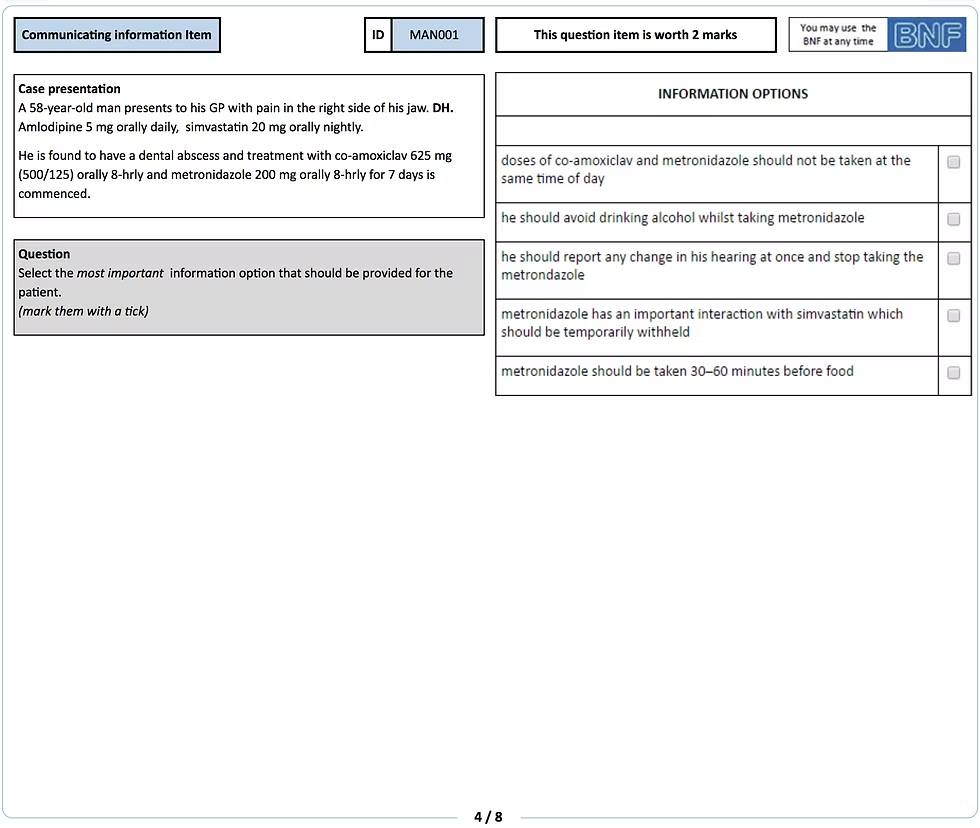
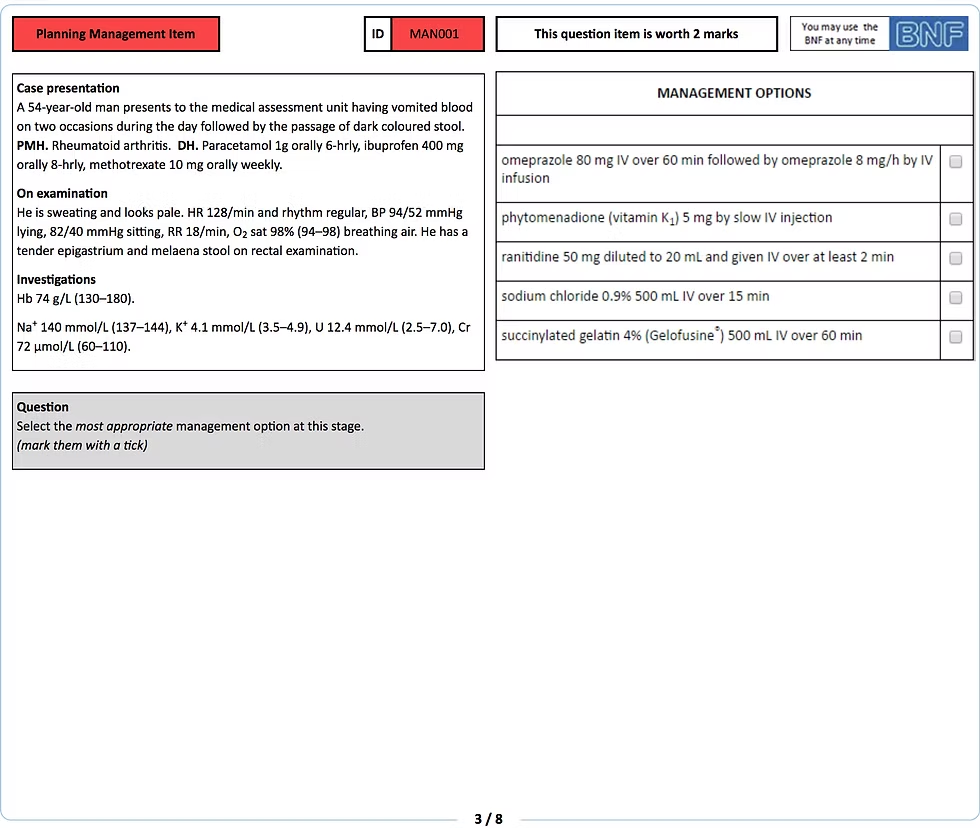
Admission status:
Open
Campus:
UK or undefined Distance Learning
Schedule:
Annual Admission
Find out more:
FAQs
Prescribing is a fundamental part of the work of Foundation Year 1 doctors, who write and review many prescriptions each day. It is a complex task requiring knowledge of medicines and the diseases they are used to treat, the careful judgement of risks and benefits of treatment, and attention to detail.
A GMC-sponsored study found that 9% of hospital prescriptions contain errors. It is also apparent in other research (see The state of medical education and practice in the UK report: 2014 and Be prepared: are new doctors safe to practise?) that this is the area of the Foundation doctor role that new graduates find the most challenging. In response, the General Medical Council (which regulates undergraduate medical education in the UK) has placed a much greater emphasis on the prescribing competencies expected of a new graduate in Outcomes for graduates (originally published in Tomorrow’s Doctors).
At the heart of these recommendations is patient safety. The PSA is designed to respond to them by raising the profile of prescribing in medical education so that FY1 doctors are well prepared to work in the NHS, where safety is a top priority.
The aim is to assess the outcomes required of newly qualified doctors in Outcomes for graduates (originally published in Tomorrow’s Doctors) as they relate to prescribing. The content of each question is relevant to the prescribing tasks expected of a Foundation Year 1 doctor as outlined in Tomorrow’s Doctors 2009, so the questions refer to ailments and drugs that students are likely to be dealing with in Foundation Year 1. Students taking the test can refer to the content of the online British National Formulary at any point during the assessment. While the BNF is a recommended resource, it is important to understand it does not answer all questions on prescribing.
The assessment aims to test eight distinct prescribing sections across a range of clinical contexts: prescribing; prescription review; planning management; providing information about medicines; calculation skills; adverse drug reactions; drug monitoring; and data interpretation.
The PSA is an online assessment. The formats of the questions vary depending on what skill is being assessed; some ask the candidate to ‘write’ an appropriate prescription for a given problem, others ask the candidate to choose the most appropriate option from a list or to perform a calculation. Examples of what the items can look like can be seen on the Example Question Items page.
The PSA includes 60 items and is two hours in length. The length of the test may be reviewed in the future, in light of developments such as the introduction of a national licensing exam and in respect of the stakeholders’ views.
Your school will submit a list of candidates registered to take the PSA no later than four weeks before your test date. At this point, accounts will be created and the school will be informed when this is complete. The PSA Lead at your school will notify you when your account is ready to activate. If you have not received a notification, please contact the PSA Lead at your school.
You will only be able to activate an account once your school has submitted a registration list for the PSA and received confirmation that the accounts have been created. This usually takes place no later than four weeks in advance of the test date. In the first instance, please confirm with the PSA Lead at your school that they have registered you for the PSA.
If your account has been created and you are unable to activate it or log in once it is activated, please ensure you are using the Google Chrome browser on a laptop or PC, and the email address your school registered you with. The PSA website is not fully compatible with Internet Explorer or mobile devices. If you are still unable to login, please send a screenshot of the error message displayed to enquiries.psa@prescribe.ac.uk with the subject header “Login problem”.
In the prescription writing questions, candidates are required to enter a signature correctly in order to receive a mark. Signatures should be entered in the following format: “FirstinitialSurname”. For example, if your name is Joe Bloggs, you will enter JBloggs.
After each PSA date, a post-assessment review is carried out. Although the PSA is automatically marked, this review checks for any answers that did not receive an automatic mark but may be eligible for marks if prescribing guidelines have been updated since the assessment was constructed. The post-assessment review can take a number of days depending on the assessments sat and the number of candidates involved and the results will be made available no later than two weeks after the PSA date (three weeks for those registered to the February PSA date). The PSA Lead at your institution will confirm when the results will be available to you on the PSA website as soon as the information is released.
The PSA Interface provides registered candidates with links to online BNF resources – BNF and BNFc on NICE website and well as BNF and BNFc on Medicines Complete.
While paper copies of the BNF and BNFc can be allowed, to be provided by the medical school or brought in by candidates, it is important to be aware that the paper versions may not contain the most up-to-date prescribing advice. PSA scoring is based on information on the BNF and BNFc websites that is most up-to-date at the time of the test, therefore candidates are strongly advised to practise using the online BNF and BNFc ahead of taking the PSA.
The BNF is a recommended resource; however, candidates should understand that it does not answer all questions on prescribing.
In 2016, OpenAthens introduced a new authentication point as a security measure, which does not allow OpenAthens to work within iframes (i.e. the PSA practice papers). In order to use the BNF and BNF for children via Medicines Complete whilst completing the practice papers, you will need to open a new tab on your browser and go directly to the Medicines Complete website.
Please note that access to the Medicines Complete BNF and BNF for children is enabled by IP address in the computer venues for the PSA. You do not need your OpenAthens login for the PSA and will be able to access the BNF directly within the test interface without being prompted for login details. It is advised that you also make yourself familiar with the NICE BNF and BNF for Children which is freely available and accessible during the PSA.
The PSA will be organised in UK medical schools in the first half of 2018. Individual schools have already selected and confirmed the date and time they will be hosting the PSA in 2018 for their students.
Current F1 trainees who have not passed the PSA on 25th July 2017 or 10th October 2017 will have one further opportunity to retake the PSA on 12th March 2018. Incoming F1 trainees for FP 2018 who have not taken or not passed the PSA while at medical school will be expected to sit the test with their allocated foundation school on 4th September 2018. Two further opportunities to retake the PSA will take place in spring 2019.
The pass mark for the PSA is set using the Modified Angoff method of standard-setting. The exact pass mark cannot be published before the test as adjustments may be required to take into account differences in difficulty across papers and also any issues with items identified after the test has been sat.
The passing standard of each question is defined by the Standard Setting Group, which is composed of undergraduate assessment experts from UK medical schools and representatives of the MSC Assessment Alliance.
In schools that use the PSA summatively, final-year students are required to take and pass the test in order to complete their medical degree. In other schools the assessment is formative and passing it is not a requirement for completing the medical degree. Students in these medical schools may still be required to take the assessment as a formative part of their medical education. Medical schools will communicate their requirements to their students.
For information on remediation and support for those who do not pass the PSA, see the PSA User Guide.
By registering for the PSA, candidates agree that information about those who pass the assessment will be available to UK Foundation Schools. Those who have not passed the PSA in the two years prior to starting their F1 job will be required to pass the test before the end of their F1 year. A PSA sitting will be held by Foundation Schools for those F1 doctors who have not taken or not passed at the PSA at the start of F1. Doctors will be made aware of Foundation School/employer requirements for the PSA once doctors have been matched to individual programmes by their allocated Foundation School (April onwards).
For the 2018 PSA, all medical schools may decide to offer re-sits, especially if the PSA is taken as a summative test. Medical schools where the test is formative should also offer re-sits. Medical schools are responsible for providing further training and support in prescribing for those re-sitting, and they will inform their students of the local re-sit dates.
Current F1 doctors who did not pass the test on 25th July or 10th October 2017 will need to undergo remediation and have one further opportunity to retake the test on 12th March 2018. F1 doctors for FP 2018 who did not pass the test while at the medical school will be able to sit the test at their Foundation School on 4th September 2018, followed by two further opportunities to retake the PSA in spring 2019.
A PSA pass is considered valid for two years. An FP 2018 applicant who has taken and passed the PSA before 2017 will be required to take it again by their foundation school.
For F1s, the PSA certificate does not have an expiry date as such. A PSA pass within two years prior to starting the F1 year is valid, but the pass does not expire during the F1 year (e.g. if a trainee joins the foundation programme in August 2018 and passed the PSA in February 2017, the PSA certificate would not expire in February 2019 before their F1 year is complete). If trainees are required to record an expiry date in their e-portfolio it is suggested that the last date of the F1 year is entered.
F1 doctors applying for FP 2018 who have not taken or not passed the PSA prior to graduation will be expected to take the PSA with their foundation school on 4th September 2018. These candidates will be registered on the PSA Interface and notified by the foundation school when they can activate their accounts. Those unable to take the test in September or who fail will be placed on a programme of remediation and will re-sit the PSA in spring 2019 (all dates to be confirmed).
30-questions-long practice papers are available to candidates who are registered to take the assessment. Candidates are strongly encouraged to complete the practice papers on their own once they are registered to understand the timing of the assessment and how long it may take to respond to different types of questions. Another important part of preparing for the assessment is learning to use the most up-to-date content of the online British National Formulary.
A demonstration paper is also available on the PSA website to allow candidates to become familiar with navigating the test pages and completing answers. Please note that this paper is for practising using the site and the difficulty of the items does not reflect the difficulty of the PSA.
Medical school staff wishing to use the practice papers as part of their teaching can be granted access through their local PSA Lead.
The 2018 version of the PSA Administrative Guide was circulated to PSA Leads at each medical school at the end of 2017. Example Questions are available on this website and we also advise the use of other general materials to prepare for the assessment. An important part of preparing for the exam is learning to use the most up-to-date content of the online British National Formulary, which is available to candidates during the assessment.
Following a paper-based assessment involving over 1,300 medical students during spring/ summer 2010, an online pilot of the PSA was carried out during 2011/12 by final-year medical students from eight UK medical schools. The feedback and evaluation of these pilots have informed the development of the PSA and the delivery system.
The feedback provided by the medical schools and students who participated in these pilots was generally very positive and many students commented that they appreciated the focus that such an assessment would place on preparation for prescribing. The main purpose of the 2011/2012 pilots was to test the PSA online delivery system in a setting that closely resembled the conditions which will be faced when the PSA is implemented more widely.
The 2013 online pilot took place between February and June in the majority of UK medical schools. This was a pilot assessment designed to test the technical delivery and psychometric properties of the assessment on a national scale. The performance of those who took part did not impact on their ability to graduate. Feedback from the 2013 pilot, revolving around aspects such as the usability of the computer interface, the provision of supporting materials, and the running of venues on the day, was very positive and constructive.
Since 2014 the Prescribing Safety Assessment has been successfully organised by all UK medical schools with final year undergraduate students.
Candidates are strongly advised to download a certificate with their performance when they receive their results on the PSA Interface in order to have a record for their future portfolio. Downloading the certificate will not be possible after the end of the academic year when PSA accounts are disabled.
Candidates who took part in the PSA in the past and have not downloaded a certificate are advised to contact their medical school in order to receive another form of confirmation of their result.
Candidates who take part gain access to feedback on their overall score in relation to the pass mark and on their score per each domain of the assessment. The local organising institution (medical or foundation school) notifies the candidates once these results become available on the PSA Interface.
It is understandable that candidates would wish to review their results and go over the questions on which they lost marks. However, the question bank has a limited number of questions and so every question made public is in need of replacement. The development of new questions is a complex process requiring considerable time and expertise.
The bank of questions is growing steadily in the hope to eventually allow ‘releasing’ old questions. The practise papers available to registered candidates have a function to display detailed feedback comments about the optimal responses to each practice question.
The MSC Assessment and British Pharmacological Society are leading the delivery of the PSA. They are supported by the Assessment Board and a cross-sector Stakeholder Group. The Assessment Board to the PSA is responsible for overseeing the recruitment of experts to write and review assessment items and for developing quality assurance processes. The Stakeholder Group includes a student representative from the BMA, and enables key stakeholders, including medical students, to be involved in the development of the assessment and the associated policies and processes.
If you are a clinical pharmacologist, pharmacist or other clinicians with an understanding of the prescribing duties of an F1 doctor and are interested in writing assessment items for the PSA then please state your background and register your interest by emailing enquiries.psa@prescribe.ac.uk.
Resources for prospective and current item writers are available on Item Authors page and they can also view Example Question Items.